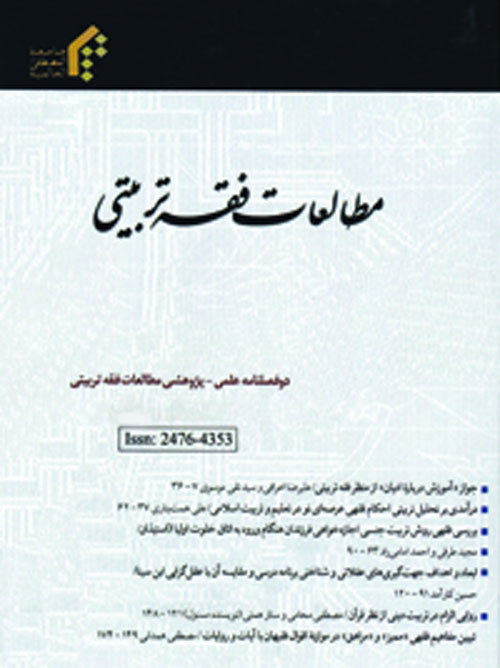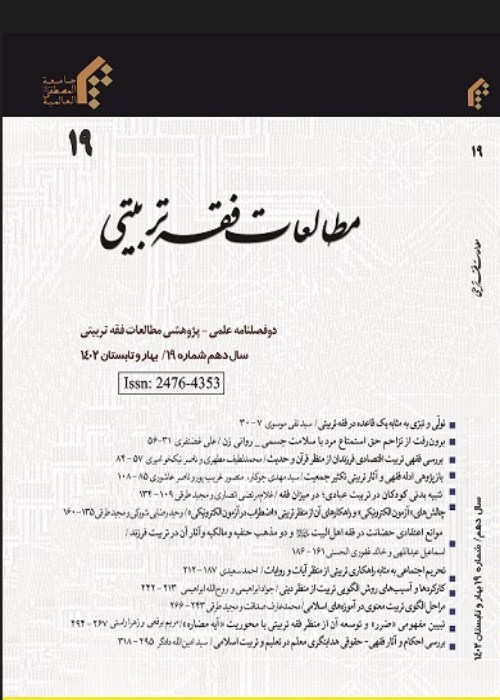فهرست مطالب

مجله مطالعات فقه تربیتی
سال پنجم شماره 9 (بهار و تابستان 1397)
- بهای روی جلد: 30,000ريال
- تاریخ انتشار: 1397/02/10
- تعداد عناوین: 6
-
-
صفحات 7-36
بخش گستردهای از تعاملات افراد جامعه در ارتباط با یکدیگر شکل میگیرد. حاصل این ارتباطها و تعامل روزمره تاثیر و تاثرهای چشمگیری است که به تدریج اثرات خود را در رفتار و شخصیت هر فرد نمایان میسازد. بخشی از این تاثیر و تاثرات در حوزه اخلاقیات رخ میدهد. با وجود چنین بستر مهمی، آیا افراد جامعه نسبت به تربیت اخلاقی یکدیگر وظیفهای دارند؟ با مراجعه به منابع دینی، برخی ادله را میتوان بر وظیفهمندی آحاد جامعه در زمینه تربیت اخلاقی دیگران اقامه کرد. این نوشتار با رویکرد فقهی و استنباط اجتهادی درپی جمعآوری و تحلیل این ادله و استخراج حکم فقهی-تربیتی این مسئله است. برای اثبات وظیفهمندی عموم مکلفان در تربیت اخلاقی، پنج دلیل خاص (آیات تزکیه، سیره معصومین^، معتبره رساله الحقوق، روایت اسماعیل و دلیل عقلی) و چهار دلیل عام اقامه شد. این پنج دلیل دارای دلالت تام بر رجحان استحبابی هستند.
کلیدواژگان: تربیت، تربیت اخلاقی، عوامل تربیت، عموم مکلفان، فقه، فقه تربیتی -
صفحات 37-62
تربیت اجتماعی عرصهای مهم از مسایل نوپیدای فقهی است که بیان حکم فقهی آن لازم است. در این میان، قواعد فقهی اجتماعی نقش ویژهای در توانمندی فقه برای پاسخگویی به مسایل نو دارد. این قواعد مستند معتبر اثبات احکام فقهی هستند. از همین رو تحلیل، تدوین و تنظیم قواعد فقهی به خصوص با توجه به تاثیر عنصر زمان و مکان در اجتهاد برای کمک به استنباط حکم فقهی ضرورتی فقهی است.
این پژوهش تلاشی در جهت بررسی حکم فقهی تربیت اجتماعی مبتنی بر نظام قواعد فقه به شیوه متعارف فقهی است و در میان ادله قابل استناد فقهی، افزون بر قواعد فقه فردی، قواعد فقه اجتماعی نیز وجود دارد و طبق مفاد قواعد عامه مذکور، مسئولیت اجتماعی به شکل عام و در خصوص تربیت اجتماعی در چارچوب احکام اولیه، ولایی و حکومتی وظیفه حکومت، خانواده، عالمان و عموم جامعه است.کلیدواژگان: تربیت، اجتماعی، فقه، حکم فقهی، قواعد فقهی -
صفحات 63-88
مقاله پیش رو در صدد تبیین ضرورت بهرهگیری از روش اجتهاد استنتاجی با رویکرد نظاممند برای تولید گزارههای تربیتی و طراحی نظام تعلیم و تربیت است. سوال اساسی که این مقاله در پی پاسخ به آن میباشد چرایی بهرهگیری از روش استنتاجی با رویکرد نظاممند و نحوه کاربست آن است. برای دستیابی به پاسخ از روش توصیفی - تحلیلی استفاده شده است. یافتهها نشان میدهد که علاوه بر بهرهگیری از روش استظهاری، باید از روش استنتاجی نیز بهره گرفت. بهرهگیری از روش استنتاجی، ابزار مناسبی برای تولید گزارهها و بسط آموزههای تربیتی از منابع دینی است ولی کافی نیست؛ بلکه برای دستیابی به نظام تعلیم و تربیت، باید جهتگیری نظاممند در تولید گزاره و نظام تعلیم و تربیت نیز مورد توجه قرار گیرد. تاکید بر رویکرد نظاممند، رویکردی نوظهور است. به همین دلیل، تلقیهای مختلفی از آن شکل گرفته و به تبع آن، عکسالعملهای موافق و مخالف چشمگیری به دنبال داشته است. به همین دلیل، پیشنهاد میشود در کنار تعمیق مبانی نظری این رویکرد، به کار بست عملی آن نیز مبادرت شود تا حدود کارایی و اعتبار آن، به صورت عینی محک بخورد.
کلیدواژگان: نظام، اجتهاد، استنتاج، استظهار -
صفحات 89-114
با توجه به جایگاه تربیت اعتقادی در تحقق تربیت دینی، نظامسازی تربیت اعتقادی یک امر ضروری محسوب میشود. دانش فقه، در طراحی نظام تربیت اعتقادی از طریق کشف و استنباط عناصر مختلف این نظام از جمله اهداف، اصول، مراحل و ساحات نقش بسزایی دارد. با نگاهی سیستمی به قواعد و تکگزارههای فقهی، خصوصا فقه تربیتی میتوان اجزای مختلف این نظام را استنباط و کشف نمود و به نظامسازی تربیت اعتقادی نایل آمد. مقاله حاضر با روش تحلیلی- توصیفی، با هدف نیل به نظامسازی تربیت اعتقادی، به استنتاج «مراحل» و «اصول و روشهای» نظام تربیت اعتقادی پرداخته است. به علاوه با مراجعه به منابع فقهی میتوان اصول کلیای را کشف و استنتاج نمود که فعالیت مربی را در نظام تربیت اعتقادی راهبری میکند.
کلیدواژگان: تربیت اعتقادی، نظام سازی تربیتی، مراحل نظام سازی تربیت اعتقادی -
صفحات 115-138
یکی از موضوعات اساسی در مباحث انسانشناسی، مسئله کرامت انسان است. روشن شدن جایگاه و کارکرد این مسئله در تربیت، به دلیل نقش مهم مباحث انسانشناسی در این ساحت از دانش، میتواند نقش بسزایی در پژوهشهای تربیتی ایفا نماید. این پژوهش با هدف دستیابی به پاسخ این سوال انجام گرفته است که جایگاه و کارکرد کرامت انسان در مباحث تربیت چیست؟ در پاسخ به این سوال، جایگاه کرامت انسان به عنوان قاعدهای فقهی در حوزه تربیت اسلامی، پذیرفته شده و نقشآفرینی قاعده کرامت انسانی در مبانی، اصول، اهداف، و روشهای تربیتی، تبیین شده است.
کلیدواژگان: تربیت، تربیت اسلامی، کرامت انسان، قاعده کرامت -
صفحات 139-158
هدف از پژوهش حاضر، استخراج دلالتهای تربیتی احکام کتابت و نشر علم است. برای این منظور باب پنجم کتاب منیه المرید فی اداب المفید و المستفید نوشته زینالدین بن علی بن احمد عاملی جبعی معروف به شهید ثانی، مورد بررسی قرار گرفت. در این بررسی که بر اساس سوال اصلی تحقیق و با رویکرد تحلیل کیفی با فرآیند تحلیل مضمون برای دریافت ایده آشکار و پنهان مولف، به روش تحلیلی و استنباطی وارد متن شده، دلالتهای تربیتی استخراج شد. یافتههای پژوهش عبارتند از: خلوص نیت به مثابه حس جهتیابی مشروع، توجه به مسئولیت اجتماعی، تولید و نشر علم نافع، سرمایهگذاری بهینه، سخاوت علمی و توسعه سرمایه. نتیجه یافتهها حاکی از آن است که دلالتهای تربیتی در دو بعد فردی و حاکمیتی قابل بیان است که در نهایت در صورت مساعدت میتواند به خیر عمومی منجر شود.
کلیدواژگان: دلالت تربیتی، احکام کتابت، شهید ثانی، خیر عمومی، حاکمیت
-
Pages 7-36
A major part of the dealings carried out by people are in respect of one another. These daily interactions have their ramifications and extensive effects that leave their impacts on every individual's behavior and character. Man's moral character is, to a large extent, influenced by these interactions. In the existence of such atmosphere, do the people in the society have responsibility towards one another's moral education and nurture? A look at the religious sources will reveal to us some of the reasons and evidences concerning the general duty of people in respect of others' moral education. This study having a juridical and inferential approach seeks to collect and analyze these pieces of evidence and then extract the juridical – educational ruling about this issue. To prove the general duty of the duty-bound, four specific reasons have been provided and put forth including the verses concerning spiritual purification, normative conduct of the Infallible, an authentic report in the Treatise of Rights, Isma'il's narration and rational argument. These five reasons perfectly prove the desirability and preference of the general duty of men toward one another.
Keywords: education, moral nurture, causes of nurture, duty-bound, jurisprudence, educational jurisprudence -
Pages 37-62
Social education is an important arena of new juridical issues which need to be discussed from a jurisprudential perspective. The juridical social rules play a special role in enabling the jurisprudence to address new issues. These principles are authentic documents which prove juridical rules. For this reason, analyzing, forming and introducing juridical principles, especially with a view to the effect of time and space in Ijtihad to help juridical deduction, is a jurisprudential necessity. This study seeks to examine the juridical ruling concerning social education based on a system originating in jurisprudential principles according to customary jurisprudential method. Amongst the evidences, there are also social juridical principles, in addition to individual juridical principles. According to the purport of the said general principles, social responsibility in general and in respect of social education within the framework of primary governmental rules, is the duty of the government, family, scholars and the society at large.
Keywords: education, social, jurisprudence, jurisprudential ruling, jurisprudential principles -
Pages 63-88
The present article seeks to explain the necessity of making use of the inferential method of Ijtehad with an organized approach to generate educational premises so as to design an efficient system of nurture and education. The basic question which this article seeks to answer is:Why should we make use of an inferential method with an organized approach? How is that method applied? To answer these questions, efforts have been made to make use of an analytical-descriptive method. Findings show that in addition to making use of istizhari (indicative) method, it is essential that inferential method be also used. Making use of inferential method is suitable for generating premises and extending educational teachings based on religious sources, but it is not sufficient. In fact, in order to achieve a system of education and nurture, it is necessary to have an organized strategy towards producing educational premises and statements. Emphasizing on an organized approach is a new approach. For this reason, different notions and understandings of it have come into being ensuing, by extension, positive and negative reactions. It is therefore suggested that in addition to depending on the theoretical foundation of this approach, it should also be practically used so that its limits and credibility are objectively put to test and ascertained.
Keywords: system, ijtehad, inference, seeking explicit meaning -
Pages 89-114
Considering the status of ideological education in the realization of the religious education and nurture, the creation of an ideological education system seems to be necessary. The discipline of jurisprudence plays a critical role in designing an ideological education system by exploring and deducing various elements of this system including goals, principles, stages and areas. By taking a systematic look at the jurisprudential rules and premises particularly those of the educational jurisprudence, we can explore and infer the different segments and elements of this system and then achieve an ideological education system. The present article using a descriptive analytical method infers the stages, principles and methods of the ideological education system with the aim of attaining an ideological education system. In addition, by referring to jurisprudential sources we can explore and infer the general principles which somehow guide the educator's activity in the ideological education system.
Keywords: ideological education, designing educational system, stagesof ideological education -
Pages 115-138
Human dignity is one of the fundamental topics in anthropology. Given the significant role of anthropology in education, it is highly imperative to clarify the importance and role of human dignity in education (tarbiya) as well as in educational researches. This study aims to explore the role and function of human dignity in education. To understand the role, it is essential to note that the human dignity has been considered and acknowledged as a jurisprudential principle in Islamic education and nurture, and the role of the principle of human dignity in the educational principles, foundations, goals and .methods have been explained
Keywords: education, Islamic education, human dignity, principle.of dignity -
Pages 139-158
This study aims to extract educational significations and implications of the writing and spreading knowledge. For this purpose, Munyatul Murid fi Adab al-Mufid wa al-Mustafid authored by Zainuddin b. Ali b. Ahmad Amili Jab'ei better known as Shahid Thani has been examined. In this study carried out on the basis of the main question of research with a qualitative analysis approach involving a procedure of content analysis to explore the author's overt and covert idea, the educational significations have been extracted with an analytical and inferential method. The findings of the research are the following: sincerity of intention as a legitimate sense of direction, paying attention to social responsibility, production and propagation of useful knowledge, optimal investment, scientific generosity and development of the asset. The result of the findings indicate that educational implications can be expressed in two dimensions (individuality and sovereignty) which can, in case of assistance, lead to public good.
Keywords: educational implications, ruling of writing, Shahid Thani, public good, sovereignty


